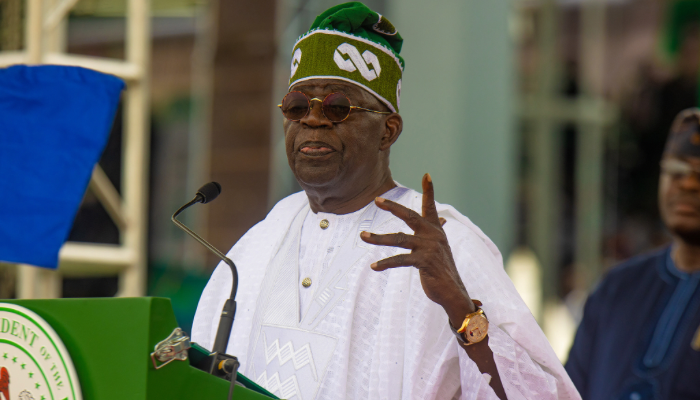As the sun rose on May 29, 2023, Nigerians were brimming with anticipation and hope when President Bola Ahmed Tinubu was sworn in as the 16th President of Nigeria; his inauguration speech painted a picture of a future filled with hopes and prosperity.
With bold proclamations like “subsidy is gone,” he signalled the dawn of a new era. Yet, the optimism that initially met his administration is now tinged with disappointment, as many promises remain unfulfilled while challenges persist.
The President’s bold vision for Nigeria was met with a mix of trepidation and optimism.
For instance, the most controversial announcement, the pledge to eliminate the fuel subsidy, was seen by many as a significant move that promised economic restructuring.
However, the reality of his policies and their implementation over the past year has led to mixed reactions, because while some of his initiatives show potential, others have exacerbated existing issues.
Here, Daily Trust highlights 10 key highs and lows of the President’s first year in office.
ISWAP fighters kill 15 fishermen in Borno
First anniversary: Nigerians demand better deal from Tinubu
THE HIGHS
Business-Centric Policies
One of Tinubu’s primary focuses has been on enhancing the business environment.
His commitment to creating one million new jobs in the digital economy and securing rural incomes through commodity exchange boards was well-received.
These initiatives aim to provide meaningful opportunities for youth and stabilize agricultural markets, reflecting his strategic vision for economic growth.
Infrastructure Plans
Tinubu’s administration has laid out ambitious infrastructure projects, including the reconstruction of critical roads like the Eleme junction-Onne axis of the East-West Road.
Such projects are crucial for improving transportation infrastructure and supporting economic activities, although their completion remains pending.
National Single Window for Trade
To promote ease of import and export transactions, Tinubu inaugurated a National Single Window (NSW) system.
This system aims to streamline cross-border trade by enabling international traders to provide required information through a single agency, enhancing trade efficiency and reducing bureaucratic bottlenecks.
Students’ loan scheme
Another notable achievement of President Tinubu’s administration is the establishment of the Nigerian Education Loan Fund (NELFUND).
This student loan scheme aims to provide financial support to Nigerian students in tertiary institutions, enabling them to pursue higher education without the burden of upfront tuition costs.
The NELFUND aims to address the longstanding issue of accessibility to education by offering interest-free loans to deserving students.
Fiscal Policy and Tax Reforms
The establishment of a Presidential Committee on Fiscal Policy and Tax Reforms marks a significant step towards addressing Nigeria’s complex tax landscape.
With a mandate to reduce the multiplicity of taxes and improve compliance, this committee aims to create a more efficient and equitable tax system, fostering a better business environment.
THE LOWS
Fuel Subsidy Removal Fallout
The removal of the fuel subsidy, while economically justified, has led to significant hardship.
Petrol prices skyrocketed, affecting transportation costs, food prices, and by implications inflation.
The intended palliatives to cushion the impact have been largely ineffective, leaving many Nigerians struggling to cope with the increased cost of living.
Security Challenges
Despite promises to improve security, the situation remains dire. Banditry, kidnappings, and other attacks continue unabated, with recent heightening incidents in Katsina, Kaduna, Zamfara and Niger states, bearing the enormity of the ongoing crisis.
The lack of substantial improvement in security measures has been a major point of criticism against the administration..
Minimum Wage Stalemate
Tinubu’s pledge to implement a new national minimum wage by the first quarter of 2024 remains unfulfilled.
The Nigerian Labour Congress (NLC) continues to push for this change, but the government’s inaction, despite high inflation and the removal of the fuel subsidy, has exacerbated the economic strain on workers.
Electricity Subsidy Removal
The removal of electricity subsidies under the administration has also been a significant shortcoming.
This policy led to a drastic increase in electricity tariffs, especially for Band A customers, raising the cost per kilowatt-hour from N68 to N225.
The sudden hike has placed immense financial pressure on households and businesses already grappling with economic hardships.
Despite the government’s rationale of achieving financial sustainability, the lack of sufficient mitigating measures has left many struggling to afford basic electricity, exacerbating the cost-of-living crisis.
Naira Free Fall
One of the administration’s economic policies was to unify the exchange rate, leading to a significant devaluation of the naira.
This decision, intended to stabilize the currency, has instead resulted in severe inflation, further eroding the purchasing power of Nigerians and contributing to economic instability.

 Join Daily Trust WhatsApp Community For Quick Access To News and Happenings Around You.
Join Daily Trust WhatsApp Community For Quick Access To News and Happenings Around You.


